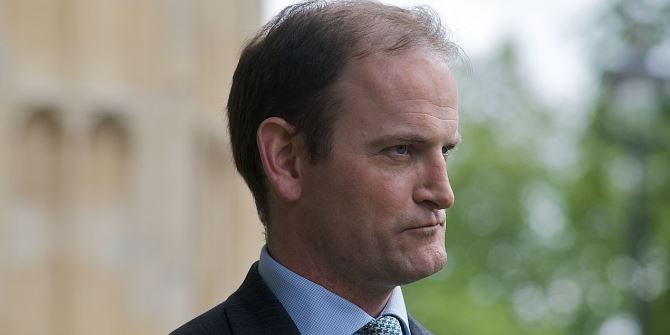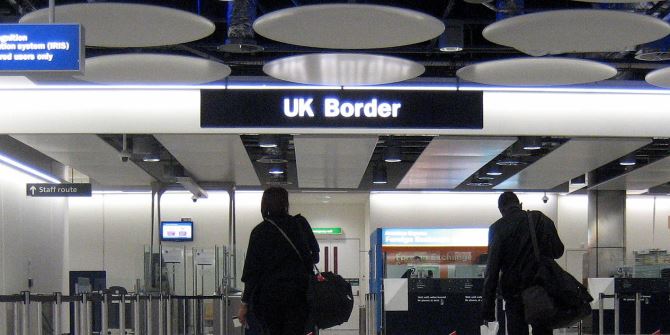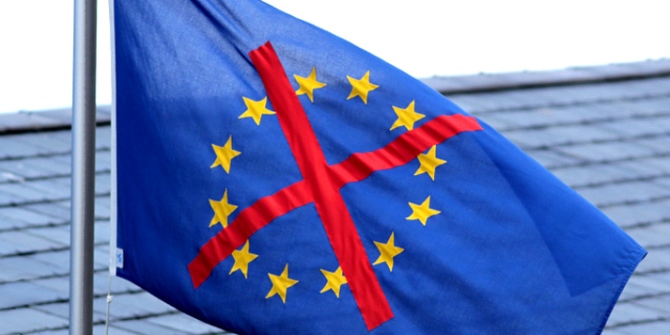 Today Conservative MP Douglas Carswell announced that he will be leaving the Tories and will call a by-election that he will contest as a member of UKIP. Paul Whiteley writes that it will be a hard fought by-election campaign but UKIP can win it, making it less likely that the Conservatives can win the general election next year if they do so.
Today Conservative MP Douglas Carswell announced that he will be leaving the Tories and will call a by-election that he will contest as a member of UKIP. Paul Whiteley writes that it will be a hard fought by-election campaign but UKIP can win it, making it less likely that the Conservatives can win the general election next year if they do so.
Douglas Carswell, the Conservative MP for Clacton, has dropped a bomb by announcing his defection to UKIP, and will call a by-election to give his constituents the chance to pass judgement on this decision. Carswell is a long-time Eurosceptic, being a vocal member of the ‘Better Off Out’ campaign and he has a reputation for being something of a maverick who is quite happy to defy the Tory Whips in Parliament. There are a number of other Eurosceptic Conservative MPs and councillors who must now be considering their positions.
It has been a good year electorally for UKIP, since they are the first party other than Labour and the Conservatives to come first in a national election, in this case for the European Parliament, since the Liberal landslide of 1906. This is a measure of how they have influenced the political climate. The party did very well in the local elections in 2013 and yet again in May of this year. In a YouGov poll for the Sunday Times published on August 22nd they received 14 per cent in voting intentions, almost twice as much as the Liberal Democrats. To add to these successes they have now claimed the scalp of a Conservative MP.
The defection is not just a little local difficulty, but has wider implications for the Conservatives’ campaign in the run-up to the general election next year. To counter the UKIP threat Conservative strategists have deployed the ‘wasted vote’ argument. They make the point that UKIP cannot deliver the ‘in-out’ referendum they have promised for 2017 if they win the next election. In an interview for the BBC Carswell said that this is disingenuous since he believes that the Conservative leadership really wants to stay in the EU while at the same time giving the impression that they want to leave, in order to keep their supporters onside.

Interestingly enough, this is a rerun of Harold Wilson’s strategy in the original referendum on membership of the European Economic Community in 1975. Labour was badly split on the issue at that time and so Wilson promised a referendum in order to control the dissenters, but then announced at the last minute that the minor concessions he had won from the European Commission justified a vote to stay in. Carswell, along with a number of other Conservative supporters, clearly think that this is what Cameron up to and they don’t like it.
Clacton is a safe Conservative seat with the party taking a 53 per cent vote share in the 2010 general election and Labour came second with 25 per cent. UKIP did not fight the seat in that election but the party soundly trounced the Tories in the European Parliamentary elections this year. In the Tendring Council area of the European Parliamentary Constituency, which includes Clacton, UKIP won 19,398 votes compared with the Tories 9,981. One of the reasons for UKIP success is the connection that Nigel Farage has made between immigration and membership of the EU. Britain cannot exclude economic migrants from the EU and now that the British economy is recovering while the Eurozone economy continues to flatline, this type of immigration is increasing.
Equally research we have been conducting at the University of Essex shows that UKIP is winning votes from people who are discontented by the performance of all three major parties in managing the economy. Voters are aware that the economy is recovering but they don’t feel the benefits themselves and so do not reward the government for a good performance. At the same time they are reluctant to support the Labour alternative on the grounds that the party was in charge when the economy crashed in 2008. As a result some people are opting for UKIP because of the highly salient issues of the economy and immigration. So the party is no longer a one trick pony which only appears to talk about the EU and little else.
It will be a hard fought by-election campaign but UKIP can win it, and if this happens it will completely derail the anti-UKIP strategy of the Conservatives and so make it less likely that they can win the general election next year.
Note: This article is co-published with The Conversation and gives the views of the author, and not the position of the British Politics and Policy blog, nor of the London School of Economics. Please read our comments policy before posting. Image credit: Steve Punter CC BY-SA 2.0
 Paul Whiteley is Professor in the Department of Government at the University of Essex.
Paul Whiteley is Professor in the Department of Government at the University of Essex.







